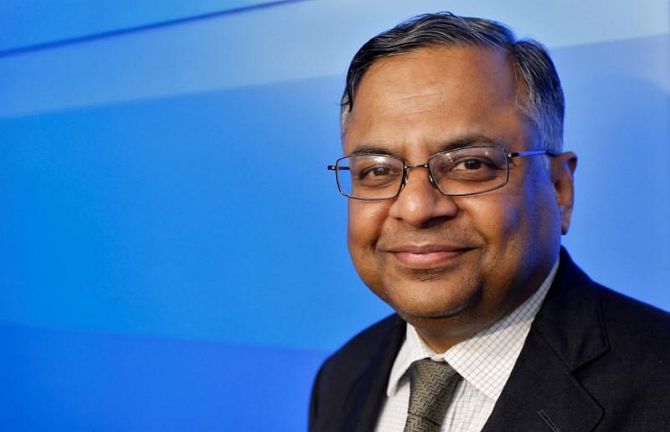 | « Back to article | Print this article |
N Chandrasekaran, chairman of Tata Consultancy Services (TCS) and Tata Sons, believes that the Digital India Act is a necessity.

“The Digital India Act is a necessity because so much has changed over the decades since the original Information Technology (IT) Act was put in place. I am glad the government is developing a participative approach to developing the Digital Act,” he said, while answering shareholders at TCS’ 27th annual general meeting.
Minister of State for Electronics and IT Rajeev Chandrasekhar a few months ago had said that the government would shortly roll out the Digital India Act — a renewed policy for the digital ecosystem and cyberspace in the country.
Chandrasekaran also stated that the world economic situation has quickly changed.
Russia-Ukraine stand-off, supply-chain shocks from higher oil prices, gas and semiconductor shortages point towards a globally sluggish growth and high inflation environment.
“The global gross domestic product growth rate is expected to grow at a slower pace than anticipated. In this context, India becomes an important market.
"India will in all likelihood be the fastest-growing major economy at an estimated growth rate of 7.8 per cent,” he said.
However, the unprecedented crisis has also created new avenues for growth and trends.
Chandrasekaran shared four trends that have emerged from these global conditions.
“First trend is digital transition: a world that is totally determined and accelerated by artificial intelligence (AI), machine learning, and data analytics.
"Second is an energy transition, which is an irreversible move towards a green economy.
"Third is a supply-chain transition, where the supply chain will get rebalanced for resilience.
"Finally, talent transition, ushering in a coming-of-age of the talent cloud, a diverse, inclusive, and global talent pool that can be accessed across the globe,” he added.
For 2021-22 (FY22), TCS crossed the $25-billion revenue mark and also reported the highest incremental revenue addition at $3.5 billion.
“Our revenue growth has been steadily increasing over the years with a compound annual growth rate of more than 1 per cent over five years,” said TCS chief executive officer Rajesh Gopinathan.
The company also said that Rs 38,010 crore was shared with shareholders in the form of dividend and buyback.
“These transactions are mostly related to either the company providing IT services or the company engaging with group companies to be able to leverage the joint procurement volume, so that the procurement can be done for the common needs of TCS and other companies,” said Gopinathan.
On getting employees back to office, Gopinathan said: “While it is my personal preference to encourage employees to return to office, there will be a hybrid work environment.
"We expect most employees to come back to offices. Under the new paradigm, the cost structure will have to be suitably adjusted.”